About:
The Foundations of HIV (FH) Series: An essential series for new HIV providers and clinicians across specialties, this training initiative offers a comprehensive understanding of HIV, from basic biology to practical care and prevention strategies.
This series is designed for healthcare providers, community workers, and others interested in combating the HIV epidemic. Click here to view upcoming series webinars.
Speaker:
Melonie A. Owusu, DNP, CRNP, FNP-BC, AACRN, AAHIVS
Lead Nurse Practitioner, THRIVE Program | Institute of Human Virology
University of Maryland, Baltimore (UMB), School of Medicine
Clinical Educator, MidAtlantic AETC
Learning Objectives:
By the end of this session, the learner will be able to:
- Describe the current guidelines for HIV screening, diagnosis, and antiretroviral therapy (ART) management during pregnancy.
- Discuss key strategies to reduce perinatal HIV transmission, including maternal viral suppression, intrapartum care, and neonatal prophylaxis.
- Identify whole-person support strategies to enhance adherence and engagement in HIV care during pregnancy.
Accreditation:
- Continuing Nursing Education (CNE): The MidAtlantic AIDS Education and Training Center is approved as a provider of nursing continuing professional development by the Pennsylvania State Nurses Association Approver Unit an accredited approver by the American Nurses Credentialing Center’s Commission on Accreditation. This event is eligible for 1.0 credit hours.
- Certificate of Attendance
In order to receive a certificate of attendance or continuing education, all required evaluations must be completed in a timely manner.
Continuing Education credits issued for participation in CE activity may not apply toward license renewal in all states. It is the responsibility of each participant to verify the requirements of their state licensing board(s).
Acknowledgement:
This website is supported by the Health Resources and Services Administration (HRSA) of the U.S. Department of Health and Human Services (HHS) with 0% financed with non-governmental sources. The contents in this presentation are those of the author(s) and do not necessarily represent the official views of, nor an endorsement, by HRSA, HHS, or the U.S. Government.




